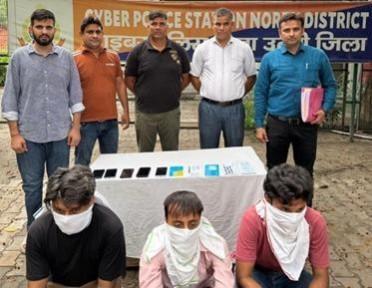
In a significant breakthrough, the Cyber Police Station of North District in New Delhi has dismantled an inter-state cyber fraud syndicate. This group swindled a Delhi woman out of Rs 11 lakh through a deceptive scheme involving fake online "paid tasks" on Telegram.
The operation led to the arrest of five individuals from Meerut and Muzaffarnagar in Uttar Pradesh, marking a crucial step in combating digital fraud.
The victim, a resident of Shastri Nagar, was ensnared by a Telegram link that promised attractive returns for completing seemingly simple online tasks. Enticed by the prospect of easy money, she transferred Rs 11 lakh in multiple transactions before realizing she had fallen prey to a scam. Upon this realization, she promptly filed a complaint through the National Cyber Crime Reporting Portal (NCRP), prompting the police to register a case and initiate a thorough investigation.
The investigation was spearheaded by a dedicated police team led by Inspector Manish Kumar, under the supervision of Assistant Commissioner of Police (ACP) Hemant Kumar Mishra. The team conducted an exhaustive technical analysis of over 100 mobile numbers and bank transactions, which played a pivotal role in unraveling the complex web of deceit.
Arrests and Interrogations Reveal Complex Scam
Persistent tracking and coordinated raids across Meerut and Muzaffarnagar led to the apprehension of Kartik Saini and Varun Kumar on June 25. This was followed by the arrests of Sharim Khan on July 7, and Humaid Khan and Suhail Saifi on July 9. During interrogation, the accused disclosed a sophisticated scam involving two distinct operational chains. Kartik and Varun were responsible for opening bank accounts and sharing access details with an individual named Yash, who facilitated the routing of fraudulent funds and compensated them with commissions.
Simultaneously, Sharim, Humaid, and Suhail operated a parallel chain, providing similar services. Humaid revealed that he acted on the instructions of a friend, Sameer Malik, who is currently pursuing an MBBS degree in Russia. This revelation underscores the international dimensions of the scam, highlighting the challenges faced by law enforcement in tackling cross-border cybercrime.
The police recovered a total of five mobile phones, five SIM cards, three cheque books, and two ATM cards from the accused. Data analysis of these mobile devices identified Humaid Khan and Varun Kumar as key conspirators, responsible for supplying bank accounts to the fraudsters. Deputy Commissioner of Police (DCP) Raja Banthia stated, "As per the data analysis of these mobile phones, it was found that accused Humaid Khan and Varun Kumar are key conspirators supplying bank accounts to fraudsters."
Broader Implications and Historical Context
The investigation has revealed the possibility of a larger racket, with several similar cases linked to the same bank accounts. This suggests that the scam may be part of a broader network of cybercriminals operating across state lines, exploiting digital platforms to perpetrate fraud on unsuspecting victims. The police are continuing their investigation to uncover the full extent of the operation and bring all those involved to justice.

This case is a stark reminder of the growing threat posed by cybercrime in India, where the rapid proliferation of digital technologies has created new opportunities for criminals to exploit. The use of platforms like Telegram to lure victims with promises of easy money is a common tactic employed by fraudsters, who prey on individuals' desire for quick financial gains.
In recent years, India has witnessed a surge in cybercrime cases, with fraudsters employing increasingly sophisticated methods to deceive victims. The anonymity provided by digital platforms, coupled with the ease of conducting transactions online, has made it challenging for law enforcement agencies to track and apprehend perpetrators. This has necessitated the development of new strategies and technologies to combat cybercrime effectively.
Global Cybercrime Trends and Prevention
Globally, cybercrime is a growing concern, with incidents of digital fraud reported in various countries. For instance, 137 Indians were detained in Sri Lanka for their involvement in online fraud, leading to the confiscation of 158 mobile devices. In response to the rising tide of digital financial crimes, authorities in Kerala have urged the Reserve Bank of India (RBI) and the Ministry of Home Affairs (MHA) to implement measures to restrict foreign access to Indian bank accounts and limit the devices used for transactions. These measures aim to curb fraud, particularly scams originating from countries like Laos, Cambodia, Myanmar, and Sri Lanka.
In another international incident, Australian authorities prosecuted a 42-year-old man for setting up fake Wi-Fi networks on domestic flights and at airports to steal personal data. The man used "evil twin" networks to redirect users to bogus websites, capturing their credentials. This case underscores the importance of exercising caution when using public Wi-Fi and disabling automatic connections to prevent unauthorized access to personal information.
The Delhi Police's successful operation against the cyber fraud gang is a testament to the effectiveness of coordinated law enforcement efforts in tackling digital crime. However, it also highlights the need for continued vigilance and public awareness to prevent individuals from falling victim to such scams. As cybercriminals continue to evolve their tactics, it is imperative for individuals to remain informed about the latest threats and adopt best practices to safeguard their digital assets.








